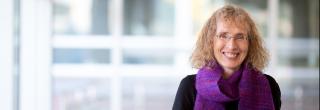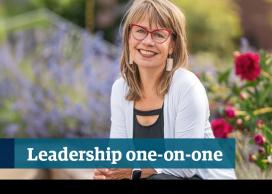Silvia Tomášková is the inaugural Dean of the Irving K. Barber Faculty of Arts and Social Sciences at UBC Okanagan. She began her five-year term on December 1, 2020.
A native of a country no longer in existence – Czechoslovakia – Dr. Tomášková came to Canada as a political refugee in the 1980s. She found her new home in Canada, and in the world of academia as a feminist anthropologist and archaeologist, with field and historical research in Europe, Siberia, and South Africa. As a theoretical scholar, her professional interests also extend to history, social studies of science, and gender studies.
Her research focuses on knowledge production, particularly about places and spaces in the deep past, as alternatives to modernity. Dr. Tomášková is also deeply committed to the representation of neglected voices.
Outside of academia, Dr. Tomášková leads an active lifestyle, loves the great outdoors and views cooking as a personal science class.
Q1. What quality do you most admire in a leader?
ST: Honesty, compassion, a sense of humour and the ability to make difficult decisions. I admire people who make decisions, whether they are personally comfortable with it, or not. As leaders, we have to be mindful that decision-making is not a popularity contest. At the end of the day, I need to make choices that represent the goals and the long-term vision of the collective. As such, it's vital as a leader to help others understand different perspectives, including my own point of view, and to be transparent around the decision-making process.
Q2. What makes you laugh?
ST: I grew up in an authoritarian country, where humour and subversion were ways of surviving an oppressive regime. So, fighting oppression with humour played such a big role in my life. Political humour was actually banned in Eastern Europe – which tells you that it was effective! Sometimes political humour might read as cynical to outsiders, but it’s a familiar coping mechanism for those facing difficult circumstances.
I also love the absurdity of everyday life, as it reminds me not to take myself too seriously. It’s about perspective and looking at things a bit differently, sometimes from a different angle, or flipped upside down. One of my favourite examples of this is Monty Python, which cleverly takes ordinary situations to their logical extremes – their parrot sketch is one of my favourites!
Q3. Who inspires you, and why?
ST: My parents are my biggest inspiration. I’m now at an age where I don’t just see them as “my parents” – instead, I see them as fully realized people whose lives were challenging, striking, and impactful.
They lived through some of the hardest periods in European history, from the 1930s, through the Second World War. Then, when they were just beginning to emerge from wartime, communist regimes took over Eastern Europe and they lost almost everything. And yet, despite the oppressive regime in which they lived, they still got married, had three kids, and provided us with a very happy childhood – they ensured we developed a strong moral foundation, ate well despite shortages, and had a chance to live a seemingly free life.
Q4. For you, what makes UBC different?
ST: I am inspired by the energy and potential of UBC Okanagan. As it is a relatively new campus, we have the flexibility to make changes. It gives us the opportunity to consider what education should, and could look like in the 21st century, and then work towards achieving that vision. For example, what is the future of research, higher education, the physical workplace, our relationship with Indigenous communities, the land, as well as our place in a wider world? This potential, coupled with agility, sets UBC Okanagan apart from other institutions, and was one of the driving factors in my decision to join the university.
Q5. What is the most important lesson you’ve learned, in your career to date?
ST: Generosity and kindness towards others can prove laborious and energy intensive and offers no guarantees that it will always pay off in achieving any particular goal, but it’s the right thing to do. Generosity also applies to a willingness to be transparent and making one’s position clear. Others may not necessarily agree with you, but at least they will understand where you are coming from.
Q6. How do you like to recharge?
ST: I never met a sport I didn’t want to try! I’ll take any outdoor sport – especially in the winter. I was a competitive gymnast as a child, then played volleyball all through high school. I’ve been ice-skating all my life, and continue to skate today.
I’m also a passionate cook who enjoys making many things from scratch. I read cookbooks and recipes as a study in history and culture – they’re an expression of people around the world; where they came from, how they live, and what they value. For example, Christmas cookies in my culture are a competitive sport (…and you know how much I love sports!) No matter how many recipe variations I’ve tried, my mother’s classic coconut macaroons are still my favourite. It’s an embodiment of the joy of my childhood.
Did you know that the coconut macaroon is Central European history and culture in a shape of a cookie? It’s a staple in many festivities of religious traditions in the region, but since coconuts never grew in Europe – where did the travellers who brought them come from? And how did this become “traditional” in this part of Europe?”
Q7. What is the best advice you were ever given?
ST: Do not accept the status quo. This advice was modelled by my parents and has served me well over the years – if I had accepted my life in Czechoslovakia the way it was, I would have never emigrated.
As Dean, I appreciate that there is a standard way of doing things, but I believe there is always more to do. In every situation, we should be imaginative and push the edges of what we think is possible, and think outside the box. Not accepting the status quo affords you the potential to have a meaningful impact.
Q8. What do you value in your colleagues?
ST: Humour, honesty, kindness, imagination and curiosity. These qualities will unlock doors for you! Curiosity is particularly important for building relationships, caring about the world, and understanding other ways of being.
I am also fortunate to work with a team of deans who embody these values and are open to conversations about our future. Together, we try to think deeply and critically about how education and research can help students become engaged members of communities, and how our collective work might address problems, both locally and globally. We take all of this very seriously, yet still find humour in the process.
Q9. What do you hope will be your lasting impact at UBC Okanagan?
ST: I genuinely hope to break down silos between disciplines, where the Faculty of Arts and Social Sciences at UBC Okanagan becomes a model for interdisciplinary engagement in teaching, research, and thought. Disciplinary training can help provide structure and focus, but it can also create walls that hem us in. We should never forget that academic disciplines as we know them, emerged under particular conditions, and in a particular moment in the history of universities and the societies they served. Anthropology (my own discipline, for example) is about 100 years old and came out of the colonial impulse of getting to know ‘the other’.
Given this, we should consider the degree to which current definitions of disciplines might sometimes prevent us from understanding our own time and the world we currently encounter. We should revisit our own fields to bridge disciplinary differences and merge them into new fields of study, remaining open to the possibilities of crossing boundaries and changing perspective.
Q10. If you could have a super power, what would it be?
ST: I would stop violent conflict and war. So much suffering and destruction can emerge from short-sighted efforts to gain power. The aggression towards Ukraine may be the most visible example of this right now, but we should not forget that ‘we have seen this film before’ in places like Chechnya, Syria, Yemen, Ethiopia, Iraq, Afghanistan... the list goes on. It’s always ‘ordinary’ people, and frequently the poorest people, who are the victims in these conflicts.
It’s a stretch of the imagination to compare academic struggles to anything like war and conflict, but these struggles can still feel like very serious conflict and entrenched warfare. If I could, I would likewise disarm our disagreements to reduce lasting harm and destruction in academic contexts.
Q11. How has your experience as a feminist anthropologist and archaeologist, and career path shaped your leadership style?
ST: I am a devout anthropologist who is dedicated to the recognition of multiple ways of being and thinking. Anthropology gives me a window into other parts of the world and encourages me to be more imaginative; I see feminism as a vital basis for recognizing others as people first, rather than using preconceived notions of their race, ethnicity, gender, or religion; and having devoted many years to archaeological research, I reject arguments that assume a singular or unchanging past.
Culture is a powerful shaper of all human behaviour, so biological arguments that focus on tendencies and abilities are, in my view, simply unfounded. The only thing that all humans do the same, is breathe. The way we’re born is shaped by culture, the way we die is shaped by culture, and everything in between is shaped by the place, the history, and the environment in which we live.
I am really dedicated to diversity among faculty and students precisely for this reason. Our students deserve diverse faculty representation, as multiple ways of thinking and being benefit us all.
Q12. What is your vision for the Irving K. Barber Faculty of Arts and Social Sciences (FASS)?
ST: My vision is to have social sciences as the central place where all social problems are addressed and resolved. Whatever we do anywhere in the world is, first and foremost, social. Technology can give us tools to solve those problems, but ultimately, they are human problems rooted in social issues and therefore need to be analyzed as social issues, and addressed using social solutions. Then, we can draw on resources and support from fields such as medicine and technology to help us.
FASS is currently a very exciting place, as we are in a period of tremendous growth. I frame my vision around thematic pillars of interdisciplinarity, indigeneity, sustainability, social justice and global engagement. These themes can help both prepare our students for the future and serve the communities around us in lasting ways.
Published: May 16, 2022
Interviewed by: Rivka Parris, UBC Internal Communications



